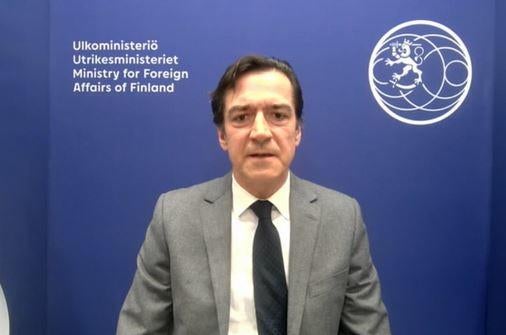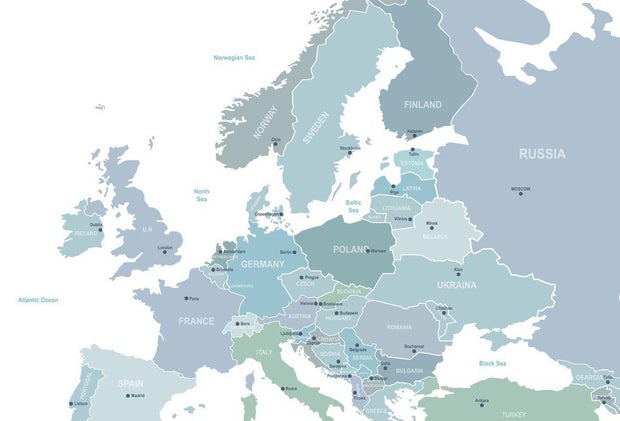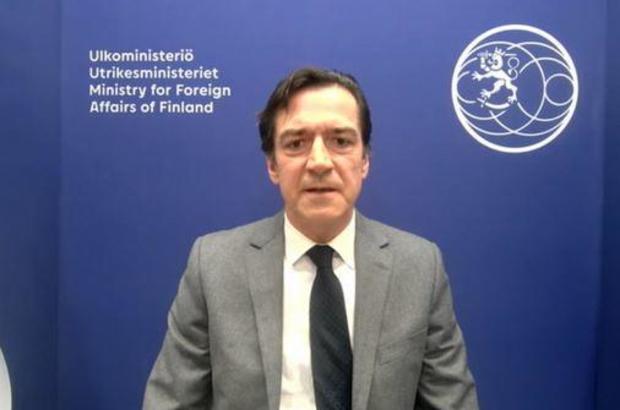United Nations — Finland took part in its first NATO military exercise last week as a full-fledge member of the alliance. It did so as it broke ground on a new border fence that will form part of the Western defensive bloc’s newly-extended eastern flank, right on Russia’s border.
- Finland says it could fend off a Russian invasion with or without NATO
Kai Sauer, Finland’s Under Secretary of State for Foreign and Security Policy, spoke with CBS News this week about what NATO membership means for his country, and the significance of the new border fence.
Why did Finland join NATO?
“We reacted to Russia, actually,” Sauer told CBS News. “It was a reaction to an action by Russia, and the action was Russia’s aggression on Ukraine.”

CBS News
“If you have a big neighbor who was challenging international law, the international security architecture, and breaking international law, I think the natural reaction for smaller countries is to seek protection, and to seek it in the collective defense organization — and I would emphasize the word ‘defense.'”
“NATO is not an aggressor” Sauer stressed, countering a narrative that Russian President Vladimir Putin’s regime pushed as a pretext for its Feb. 24, 2022 full-scale invasion of Ukraine.
- Here’s what Finland’s NATO membership means and why it matters
“Russia was ill-advised,” Sauer said, in hoping that its invasion would prevent the expansion of the NATO alliance. Finland and Sweden both formally requested NATO membership as a direct reaction to the Ukraine war, and Sweden is widely expected to become the next new member later this year.
Russian officials “know full well that the Finns have had a pretty impressive military for years, and it isn’t there to deter Sweden,” Richard Gowan, U.N. Director for the International Crisis Group, told CBS News. “In any conflict, the Finns were always likely to end up on NATO’s side in the end.”
While Finland and Russia managed relations as peaceful neighbors for decades, even after a Soviet invasion in 1939, Gowan said Russia’s invasion of Ukraine “changed the public and political mood in Helsinki overnight.”
Sauer himself said last year, when Finland applied for membership, that it was because of the “Russian brutal aggression in Ukraine,” which quickly pushed public support in Finland for NATO membership from 20% to 70%.
What does NATO membership change?
The most direct implication of Finland’s membership stems from Article 5 of the treaty that established the alliance, enshrining the concept of collective defense. It states that any attack on any member nation will be treated as an attack against all of the alliance, so now, any attack on Finland, by Russia or any other nation, would be deemed an attack on the U.S. and the other NATO nations.
“The border of NATO with Russia will basically double after we became members,” Sauer said, referring to Finland’s more-than-800-mile shared land border with Russia.
He said the new border fence Finland is building is intended primarily to fortify areas around border crossings, and it will stretch across about 10-20% of the total border when completed.

While Finland wrapped up its first military exercises with the alliance last week, 10 days after becoming a full member, hosting Portuguese and German warships at Helsinki ports, Sauer noted that his country has been part of the NATO Partnership for Peace program since 1994, and has taken part in joint exercises regularly for decades.
“The Russians are clearly observing how we will behave as NATO members and, of course, the Finnish NATO membership will have certain consequences, but it is in our interests to have a good working relationship with Russia.”
Finnish officials have acknowledged that the border fence is somewhat symbolic, but said it’s aimed at giving Helsinki greater reaction time in the event of any military action against the country, and at preventing illegal migration.
What’s next comes next?
Both Russia and Finland have said they can continue to live alongside each other as neighbors, but the Ukraine war has stalled their previous collaboration.
“You can be a NATO member and still can have a constructive relationship with a non-NATO member or neighbor,” said Sauer. “Look at Norway, for instance. They have a common border with Russia. Until Ukraine, the relationship has been working quite well on a factual basis, in a polite way… Of course, it’s hard now with Russian aggression.”
Alexander Pankin, Russia’s deputy foreign minister, told reporters at the U.N. Wednesday that Russia considered Finland its “closest neighbor. I wouldn’t say friend, but a very accommodative partner… who cooperated in energy.”
He acknowledged that cross-border trade, including in the vital energy sector, “shrunk immensely during last year.”
Gowan said it was unlikely that the Russians would overreact to Finland’s NATO membership, however, describing Moscow’s response thus far as “quite restrained.”
“The Finns do have a knack of explaining their choices in ways that the Russians understand, even if Moscow may not like it,” he said.
Russia has been left largely isolated on the world stage, as demonstrated by multiple votes at the United Nations, though binding Security Council resolutions condemning its invasion of Ukraine have been thwarted by its own council membership and that of its ally China.
“The numbers show how isolated Russia is — just a few countries actually on their on their side,” said Sauer, who previously served as Finland’s U.N. ambassador.
Asked if he believed Russian officials cared about their country’s global standing, the Finnish diplomat said, “they should.”
“They are human beings, who are even smart human beings, who have exposure to the media. They are talking to their colleagues,” he said. “They should know how wrong their position is.”
Pamela Falk 
Pamela Falk is the CBS News correspondent covering the United Nations, and an international lawyer.
